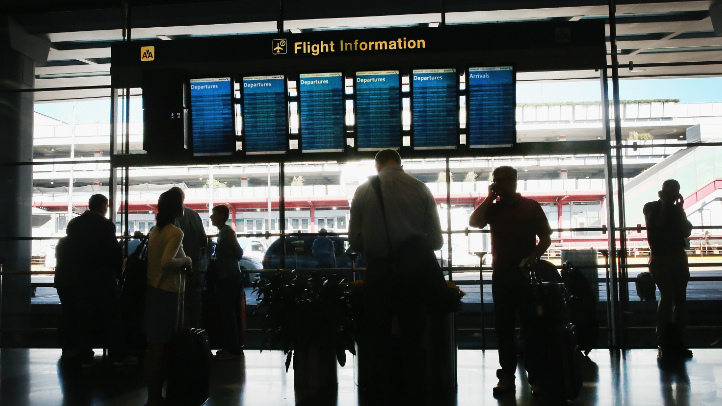Chicago updated its emergency travel order guidance on Tuesday, moving both Texas and Nebraska into a higher risk category for travelers.
Under the new guidance, which takes effect Friday, the two states are now listed under the "orange tier," which requires a 10-day quarantine or pre-arrival negative test no more than 72 hours before coming to Chicago, officials said.
Last month, Chicago's travel order was updated to exempt those who are fully vaccinated from the 10-day quarantine or negative COVID-19 test requirement.
Several states were also moved from the "orange tier" to the lesser "yellow tier" under the city's travel order, meaning their case rate has dropped below the threshold.
Feeling out of the loop? We'll catch you up on the Chicago news you need to know. Sign up for the weekly Chicago Catch-Up newsletter here.
Here's a look at where each state stands:
- 25 yellow states and 1 territory: Michigan, Iowa, Idaho, Idaho, Minnesota, Ohio, Mississippi, Montana, West Virginia, Maryland, Maine, New Mexico, Indiana, Arkansas, Louisiana, Nevada, Kansas, North Dakota, Wisconsin, Washington, California, Wyoming, Missouri, Oregon, Puerto Rico, and Hawaii
- 24 orange states and 1 territory: New Jersey, New York, Rhode Island, Florida, Delaware, Georgia, Connecticut, Texas, Colorado, North Carolina, Vermont, Kentucky, Alabama, Arizona, Pennsylvania, South Dakota, South Carolina, Massachusetts, Tennessee, Alaska, District of Columbia, Utah, Nebraska, Virginia, and New Hampshire
While health officials urged residents to avoid travel if possible, the requirements for each category are as follows:
- Yellow: States with a rolling 7-day average less than 15 cases/day/100k residents.
- No quarantine or pre-arrival test required. Maintain strict masking, social distancing and avoidance of in-person gatherings
- Orange: States have a rolling 7-day average above 15 cases/day/100k residents
- 10-day quarantine OR pre-arrival negative test no more than 72 hours before arrival in Chicago with strict masking, social distancing and avoidance of in-person gatherings
or - Be fully vaccinated, as defined as two weeks after the second dose of a two-dose COVID-19 vaccine or two weeks after one dose of a single-dose vaccine and not have symptoms
- 10-day quarantine OR pre-arrival negative test no more than 72 hours before arrival in Chicago with strict masking, social distancing and avoidance of in-person gatherings
The travel order - first issued in July and modified several times since - now requires anyone entering the city from states in the "orange tier" to quarantine for 10 days upon coming to Chicago or test negative for COVID-19 within 72 hours before arrival.
Local
City health officials recently updated the order to exempt anyone fully vaccinated and without COVID-19 symptoms from the quarantine or test requirement to bring the policy in alignment with new guidance from the Centers for Disease Control and Prevention, according to the Chicago Department of Public Health.
"Fully vaccinated is defined as being at least two weeks after receipt of the second dose in a two-dose COVID-19 vaccine series or at least two weeks after receipt of one dose of a single-dose COVID-19 vaccine," CDPH said in a statement.
"Fully vaccinated travelers must monitor their health for 14 days after travel and if they experience symptoms potentially consistent with COVID-19, they must self-isolate until clinical evaluation and COVID testing," CDPH continued. "They also must continue to adhere to all recommended protective measures including wearing a mask (and using job-specific personal protective equipment), maintaining physical distance, practicing hand hygiene, and avoiding crowds."
Health officials still recommend canceling all non-essential travel, vaccinated or not.
"Though the Chicago case numbers have dropped of late, this is not a time to let our guard down," CDPH said in a release. "To maintain the current trajectory, we must double down on what we know prevents COVID spread. This includes wearing a mask, maintaining social distancing, washing your hands and staying at home as much as you can. Chicago residents are strongly advised to cancel non-essential travel."
The guidelines and restrictions for the emergency order changed last month, adjusting to the two-tiered system categorizing states as either orange or yellow and eliminating a previous "red" category.
The emergency travel order requiring a quarantine for travelers from certain locations was first issued in July in an effort to slow the spread of the deadly coronavirus.
The city said it hopes to simply educate travelers about the order, but those found in violation could be subject to fines of between $100 and $500 per day, up to $7,000.
"The quarantine and pre-arrival testing requirements apply to people even if they have no COVID-19 symptoms," the city's health department said in a statement last month announcing the order's update.
Exceptions can be made for travel for medical care, parental shared custody and business travel for essential workers. It also does not apply to an individual passing through states for less than 24 hours over the course of travel, including layovers at airport or people driving through a particular state. Daily commuters to and from neighboring states are also exempt.



